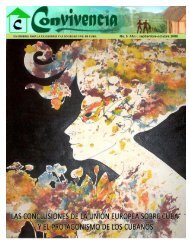conscience universally assumed. The onlyway to prevent forever the unjustpersecution or imprisonment of hundreds ofbrothers for reasons of conscience orpolitical option is enjoying freedom andresponsibility on the part of all citizens,having an absolute respect for all of theirrights and duties and all of them under theguarantee of a legal framework. It’s a matterof democratic governance. If not, the prisonswill be filled again as long as there is aCuban, man or woman, who tries to exercisepacifically his civic, political, economic,cultural or social rights and duties, which areinalienable and inseparable from pacificcohabitation in its highest degree. To ratifythe Covenants is therefore to fulfil a debt tothe political mission of the State which is tocreate and safeguard a framework of Lawthat protects the citizens and makes easy forthem their full and democratic participationin the institutions and in the independentassociations of the civil society.Economic and Social ReasonsThere is another reason why Cuba mustratify the Covenants on Human Rights:because it would be in correspondence withthe wish of progress and welfare of thepresent and future generations of Cubans,men and women. All the respectedeconomists and sociologists of our timecoincide in the criterion of linking deeply theeconomic welfare with the holistic humandevelopment and linking the civil andpolitical liberties with the development of thepeoples. Let’s remember the anthologicaltreatise by Amartya Sen who is a Nobelprizewinner on Economics. The name of thetreatise is “Freedom and Development”. Thetwo Covenants therefore complement eachother inseparably. Without economic, socialand cultural rights the civic and politicalrights cannot be properly exercised and viceversa. The economic independence promotesand demands the liberties of the citizen.Without respect to the inherent laws ofmarket, even when they are properlyregulated, there is no economic right ormaterial autonomy to exercise the politicalrights. The same way, without respect to therights of the peoples it won’t be possible thefair distribution of the created richness. Toratify the Covenants is, therefore, to fulfil adebt to the Cuban vocation for the economicprogress, for social justice, and for a holistichuman development.Civic and Patriotic ReasonAnother reason to ratify the two Covenants onHuman Rights is because it corresponds to themost genuine and deeply-rooted inheritanceleft by the founding fathers of the nation: sinceFr. Varela to Luz y Caballero, from Céspedes toIgnacio Agramonte, from Antonio Maceo to JoséMartí; they not only fought for the freedom andthe rights of all Cubans but they wereeducators of those rights and duties in each ofthe epochs they lived. The Apostle of ourIndependence proposed precisely the following:“the first law of the Republic should be the cultof the Cubans to the full dignity oh man”. Toratify the Covenants that represent today themaximum endeavour of humankind to reachsuch dignity for all men equally, is therefore, tofulfil a debt to the roots of our Fatherland.Cultural ReasonCuba must ratify the two Covenants on HumanRights, besides, because that corresponds tothe essence of our national identity. Even whenthey did not have the political liberty, the firstCubans who thought with their own brains andtaught us how to think, wrote constitutionalprecepts that guaranteed the fundamentalrights: Starting by that kind of constitutionalessay written by Joaquín Infante in 1810; alsothe proposal made by Fr. José AgustínCaballero in 1811; the one by Claudio GabrielZequeira in 1811 up to the one presented by Fr.Félix Varela in the Spanish ConstituentAssembly in 1820: he had been democraticallyappointed to be a deputy. Then, at the verybeginning of the first wars of Independence theCubans, women and men wanted to define andguarantee the rights of the free citizens:Starting by the original Constitution ofGüáimaro (1869), also the one of Jimagüayú(1895) and the one of La Yaya (1897). From theConstitution of the Republic of 1901 up to theConstitution of 1940: the most democratic,progressive and inclusive one of all of theConstitutions in the Cuban nation, includingthe Socialist Constitution of 1976 whichestablished the dictatorship of one class overthe rest of the nation. We can say that in theCuban culture there is an indelible influence ofEdiciones <strong>Convivencia</strong>Pinar del Río. 201273
democracy even when all of theseconstitutions were, in some way and in adiverse degree, ignored, violated in part ortotally, by foreign interventions, coups orunfair laws. In order to assure thedemocratic and constitutional tradition in thesoul of Cuba is enough to remember the verycurrent doctoral thesis by the lawyer IgnacioAgramonte. To ratify the Covenants onHuman Rights is, therefore, to fulfil a debt tothe essence of our national culture.Anthropological ReasonCuba must ratify the two Covenants onHuman Rights, all in all and above all,because those instruments of InternationalLaw, even when they are perfectible, areconsidered the age of majority, the respectand the safeguard of the dignity of each manand woman. They are and should be the bestway to reach the maximum personalfulfilment, the social cohabitation and ademocratic participation for all Cubans, menand women, with no exclusions. Everyeconomic, social and political system shouldhave as a principle and end the securing ofthe happiness of every human person andthe common good for the whole society.Without educating, respecting and defendingthe rights and duties in a systematic andunrestricted way, no nation can live in peaceor progress material or spiritually. Thehuman person, who is the centre, the subjectand the end of all the institutions, is at stake.To ratify the Human Rights Covenants istherefore, to fulfil a debt to the search forhappiness and the holistic development of allof the Cuban citizens.So because of these and other reasons wemust look for, spread and propose among allof us, the ratification of the Covenant onCivil and Political Rights and the Covenant onEconomic, Social and Cultural Rights is apriority, it’s a duty and a significant step inthe path to place Cuba as a full, normal andsupportive member in the community of allnations. The international community andseveral regional groups ratify each year theirwill that Cuba be treated with no restrictionsor embargos whether these are internal orexternal, political or economic. Theinternational community and the regionalgroups have the moral authority to recognize,demand or criticize and accompany any countryin the world in the respect anddecriminalization of the exercise of HumanRights, even when in their own countries theyare not fulfilled in part because no nation isperfect. If that moral authority is so valid andrecognized to condemn every economicrestriction ethically unacceptable, it should alsobe useful to denounce the violation of othercivil and political rights inside the nation thatendures the embargo. Cuba should thank theinternational concern for its welfare andhappiness.Once both Covenants are ratified, a new stagewill be opened for Cuba. We have the convictionthat the new stage could move forward in adynamic and efficient way based on twofundamental axels: the civic education for alland the legal reform with the participation of all.Any person can ask himself: what is the impactthat the ratification of some internationalCovenants will have on the every day life? If theCovenants are well implemented the life of thecitizens will change. If the national laws areadapted to the Covenants all of us will knowwhat to do and will know our spaces and thespaces of others. It will open to each person anew field for creativity and initiative whether itis private, cooperative or public. An atmosphereof personal and civic security will be createdand the defencelessness to which all of us areexposed will be healed. It will be, for eachcitizen, like an oxygen cylinder that will spreadout the asphyxiated lungs of the enterprisingpersons and the creators. Everyone will notice.Under democracy, with a supportivecommitment and the accompanying of theinternational community, the cohabitationinside Cuba will have a qualitative improvement.The institutions will be healed under the rule oflaw and not under arbitrariness and thecorruption of the ones who decide in theseinstitutions as if they “ruled a camp”. Each oneof the Cubans will have the tools for oursecurity and the exercise of rights and besides,the impartial mechanisms for defence in casethose tools fail, in case they those tools areviolated or fall under the mafia or thecorruption.All might remain the same if the Covenantswere dead letter and if the unjust laws are notEdiciones <strong>Convivencia</strong>Pinar del Río. 201274
- Page 2 and 3:
Consejo de Redacción de Convivenci
- Page 4 and 5:
Cuba does have thought, projects an
- Page 6 and 7:
with their changes and hesitations,
- Page 8 and 9:
well, eveyone knows that they are n
- Page 10 and 11:
There has to be a differentiation b
- Page 12:
lind. Infiltrations of bureaucracy
- Page 15 and 16:
We are, and we should be “the pro
- Page 17 and 18:
have been introduced during decades
- Page 19 and 20:
sacrifice his life, his prestige, h
- Page 21 and 22:
have different political options, i
- Page 23 and 24: there is political will and changes
- Page 25 and 26: Conclusions from its Council. We th
- Page 27 and 28: TO FREE THE PRODUCTIVE FORCESAND TH
- Page 29 and 30: tentative behaviors by the governme
- Page 31 and 32: the three powers of the State: the
- Page 33 and 34: what in our opinion is better for C
- Page 35 and 36: THERE IS NO FATHERLAND WITHOUTTHE S
- Page 37 and 38: Fatherland going to belong to every
- Page 39 and 40: CULTURE AND POLITICS IN CUBAEditori
- Page 41 and 42: that bearing in mind the strategies
- Page 43 and 44: POWER IS FOR SERVINGEditorial 10. J
- Page 45 and 46: An authentic exercise of power as a
- Page 47 and 48: “mosquitoes” which are the smal
- Page 49 and 50: “For I will take you from among t
- Page 51 and 52: forward by seizing the institutions
- Page 53 and 54: democratic participation where they
- Page 55 and 56: north and south of the human person
- Page 57 and 58: wins with the complementation and t
- Page 59 and 60: has reached a citizenship category
- Page 61 and 62: THE ABSOLUTE RESPECTFOR ALL OF THE
- Page 63 and 64: It is clear that it is about the in
- Page 65 and 66: negotiation techniques because it c
- Page 67 and 68: who are firmly coherent, which does
- Page 69 and 70: The government faced one first dile
- Page 71 and 72: credibility, the service and thesov
- Page 73: make them coherent with those inter
- Page 77 and 78: ECONOMY WITH FREEDOM AND RESPONSIBI
- Page 79 and 80: ethical dimension of the debate abo
- Page 81 and 82: expecting from us Cubans, men andwo
- Page 83 and 84: fraternal, humanitarian institution
- Page 85 and 86: or social institution should keep i
- Page 87 and 88: State and the worst way to violate
- Page 89 and 90: diversity would not be considered a
- Page 91 and 92: democratic government whose capacit
- Page 93 and 94: is no possible development. Back in
- Page 95 and 96: dimension in order to safeguard the
- Page 97 and 98: .Requirements to publish announceme
- Page 99 and 100: That is why it is logical and good
- Page 101 and 102: or repressed for his faith and for
- Page 103 and 104: CIVIC FRIENDSHIP AND PACIFIC COEXIS
- Page 105 and 106: we have arrived to the conclusion t
- Page 107 and 108: Assembly in 1940:“! Parties, stay
- Page 109 and 110: WHAT COMES AFTER THE POPE’S VISIT
- Page 111 and 112: the search for it always implies an
- Page 113 and 114: In number 6 of our cited Editorial
- Page 115 and 116: CUBA DOES HAVE THOUGHT, PROJECTSAND
- Page 117 and 118: everlasting projects shall be never
- Page 119 and 120: prisoners of conscience. This group
- Page 121 and 122: After 110 years of the birth of tha
- Page 123 and 124: one ideology. To use persons to see
- Page 125 and 126:
perspective given by any statesman
- Page 127 and 128:
we respect everybody, we live weavi
- Page 129 and 130:
Relación de artistas cubanos y las





